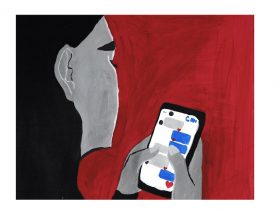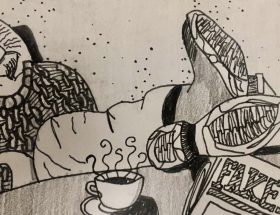this article links directly into Nadia Lee‘s other piece in this issue, named “The system has failed them – American youth of colour are being left behind“
The system in question is a development, a progression of a society that relied heavily on slavery to function. The Oscar-nominated documentary 13th explores how the American prison system was created to allow America to reap the benefits of slave labour in a society which has abolished slavery. So much of American history is littered with attempts to suppress and silence minorities, such as the ‘war on drugs’, led by Republicans which resulted in a dramatic increase in prison populations.
America government and institutions continue to work to oppress minorities – whether that is by creating a fear of the ‘black poor’, by increasing sentencing for drugs most associated with black communities, or by the use of private prison contractors which had an economic incentive to keep prisons full.
In this sense, the system is broken – it is founded on racism and continues to promote a racist agenda. So can it really be fixed?
There are efforts being made to solve these problems of institutionalised racism. Obama’s Chicago- based BAM (Becoming A Man) initiative which aims to address the problem of violence amongst black youth has been effective in engaging young black men in a conversation about the use of aggression and violence which leads to such high arrest and imprisonment rates for this demographic. This is an admirable effort, but it is not attempting to change the system. The black men who are not impacted by the initiative are still suffering racially biased sentencing and imprisonment. BAM is reducing violence amongst the young black youth involved, and increasing high school graduation rates. But it is only dealing with a part of the problem. It is trying to reverse the damage that the system has done to these young people – teach them an alternative way of life to the world of gang and gun violence. However, this initiative is always going to be necessary for each new generation until the system is changed. A group of enlightened young black men who have discovered new attitudes and behaviours that help them rise above the world they grew up in is a genuine step forward, an encouraging bit of progress. But as long as they live in a system that continues to push them down, that gives them fewer opportunities, fewer chances than their white counterparts, a system that is more likely to arrest and lock up a young man of colour for the same crime compared to a white man, then they are still fighting an uphill battle.
It is easy to condemn this foreign power, to criticise their societal structure and sympathise with the oppressed minorities. But can change be enacted? Or is the system broken beyond repair, is a new template needed for modern America? Awareness is, as always, the first step for either option. Widespread awareness is needed of the prison system’s basis in racism, to understand how each new bill and act is written to push minorities down to prioritise the rights and privileges of certain people. But initiatives such as BAM, whilst admirable and impressively effective, are helping to mitigate the symptoms rather than cure the disease. To truly erase institutionalised racism, to give youth of colour an equal opportunity to succeed and be brilliant, a total upheaval of the system is needed.




